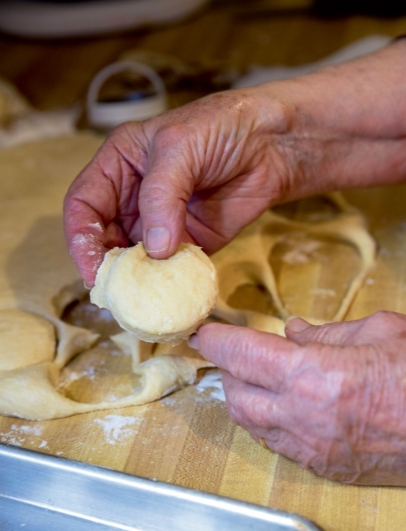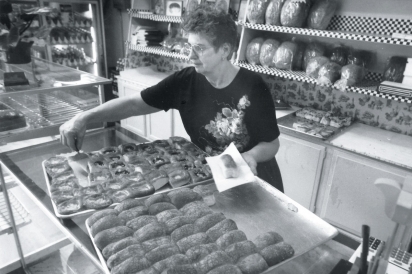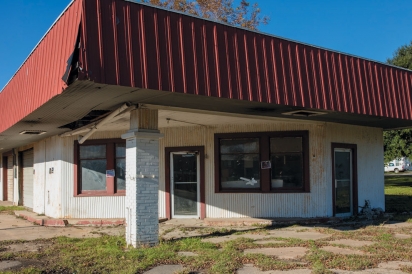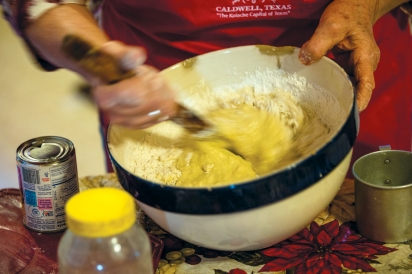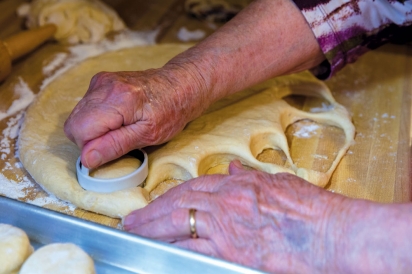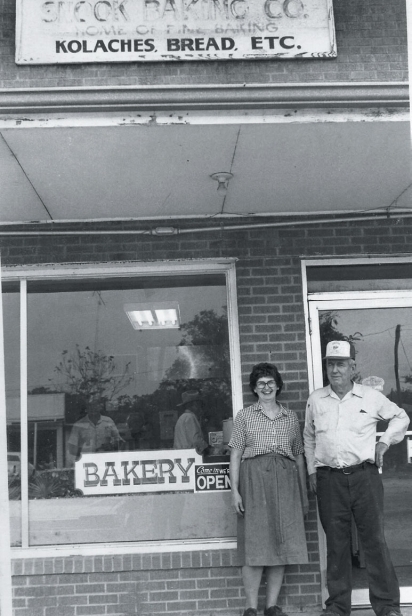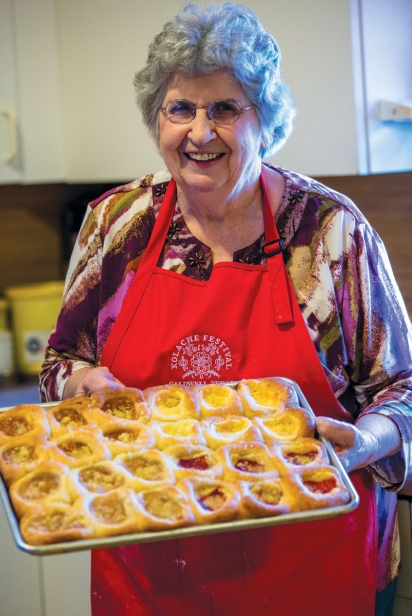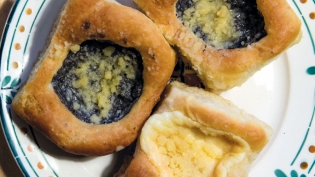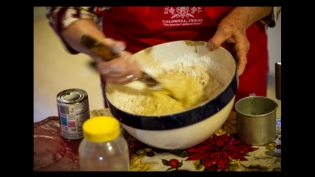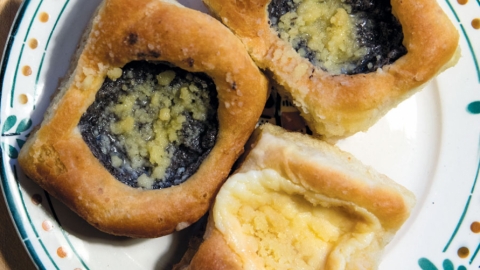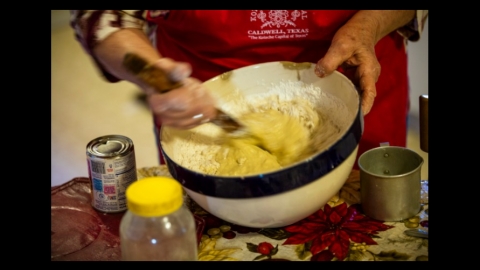The Czech Queen of Kolache
Bez práce nejsou koláče—without work, there are no kolaches.
Lydia Mae Faust’s hands seem even bigger than they look when you hear what they’ve gone through. They are what I notice first as she rolls out her dough. I’m looking at hands that used to milk cows every morning. Hands that mixed their first cake before they could reach a table. Hands that wrestled with mule-drawn hay rakes and cotton choppers over miles of Texas land, growing up on the Vajdak family farm in Burleson County, just west of College Station.
Before they found their calling in dough, her hands found their strength from tying wire for as many as 500 bales of hay a day. They built chairs in a factory in Caldwell to help feed her family. They raised four children and worked with her husband, Moody, in the cotton fields. And at an average of about 300 dozen a week, this baker’s hands were probably responsible for almost a million dozen homemade kolaches in the 47 years she’s been selling to the public.
At her home in Snook, Texas, the now- 82-year-old looks at me from behind copperrimmed glasses with concentration in her dark eyes as I ask her how she first started at the bakery. “There’s a secret to what you do,” I say, coaxing her to find words to her beginning as a baker. She looks up and thinks for a moment and says, “Yeah there is. It’s spelled l-o-v-e.” She laughs then pauses, gathering her memories. “Well, we can make a batch of kolaches. How ’bout that? I do it with my grandkids all the time.” It’s as if the best way she’s found to tell her story is to make one more batch of the delectable stuffed pastries.
Like many Czech families in Texas, baking for Lydia began first in a working farm home. She was born in Rogers, just south of Temple, in 1933 before they moved to settle permanently in Snook in 1945, where her father was born. That’s when they got electricity and started getting ahead. “I went all the way through school in feed sack dresses,” she said. Each year she’d spend the first months of school chopping cotton in the fields with her brothers and sisters, until the harvest was in. She’d milk the cows before school and when she came home, she’d work the fields till sundown. Baking days for her were first a day of rest—reserved for Sundays and when it rained.
She married Moody Faust in 1953. They continued to work on the farm together until around 10 years later, when Moody started working for Charlie Sebesta in the furniture store in town, doing plumbing work for rural homes as part of a federal program. It was Charlie who asked Lydia if she’d like to open up a bakery, and she said sure. That first day she came to work, she used her own bowl and spoon to mix the first batch. They didn’t even have pans at first. Charlie had found a pizza oven at an auction in Houston and was still scrounging up supplies those first few weeks, she said. The town needed a gathering place, and he liked sweets, so he added on a room in the furniture store, found her some supplies and opened the Snook Baking Co. in 1968.
Lydia and her husband bought the business from Charlie in 1983. Soon she was going through 10 to 12 sacks of flour a week, and was averaging 200 dozen on Saturdays. To Snook, the bakery brought the little town of about 500 together in ways it might not have otherwise. She was known to always have a warm coffee pot brewing a little after 4am except on Sundays, and to the Czech old-timers, she was loved for her homemade cottage cheese kolaches made with milk from her own dairy cow until the bakery got too big and too busy to handle the work. To Lydia ingredients were critical even as the business grew, sourcing her favorite Pioneer Flour from San Antonio, the right butter and commercial lard and always making her own fillings. She never could stand the canned commercial poppy seed fillings. Instead, she’d grind the seeds and make it herself, adding cream and butter for the perfect texture and flavor.
PRESERVING THE PAST
The year she opened her bakery, she says, was the year the homemakers club in Caldwell were selling baked goods at a courthouse Harvest Festival one Saturday and called her up asking if she had any kolaches left. She whipped up 25 dozen that afternoon and they were sold out before the event was over. That’s when the ladies decided to make it into a festival. Lydia has served on the Caldwell Kolache Festival committee ever since, helping build it into a statewide attraction to Burleson now for 32 years.
Though Lydia turns her nose at what some commercial stores call a kolache, she likes to see them for sale and see so many new bakers learn how to bake them. She’s open to wilder flavors like piña colada or an Oreo-filled at the baking contest last fall. She continues to add to her own skills, traveling in the Czech Republic a few summers ago when she stumbled on a baker with a product she found delicious. She sold her business to Robert and Pat Collins in 1996, and they kept it running as Czech-Tex, adding on a barbecue and steak restaurant, which they operated until handing it over to new owners in 2013. The restaurant has since closed its doors, leaving the spot where the Snook Baking Co. stood for over 45 years vacant for the first time.
Lydia lives in the same house they bought in 1956. She now bakes out of her small home kitchen, just walking distance from the counter she used to stand behind for all those 14-hour days. I remember her standing there with the Snook Baking Co. sign when I ordered my first kolache of hers as a young girl of about 7. The sign was in blue letters—for the blue jay, the school mascot—and red letters for the prices that seemed to never change: 30 cents a kolache, 30 cents a sausage roll. And now, almost 30 years later, about the same age she was when she opened her bakery, I made my way back to the source to mix my first bowl of dough—something her own mother never really showed her. The mixing, she recalled, “that was something you had to experience on your own.”
Now that her bakery is closed, she still bakes for private orders in the community. She doesn’t miss the long hours, but she does miss the people. Her prices haven’t changed much in the years since she bought the bakery in 1983. She still sells them to friends for $10 a dozen, but admits to me, “I’m thinking real strongly I ought to go up.”
Passing on the Process
Inside the Snook school cafeteria, the SPJST (stands for Slovanska Podporujici Jednota Statu Texas, or Slavonic Benevolent Order of the State of Texas) Lodge #9 youth program— from age 6 to adults—arrive with bowls, pans and a wooden spoon. It’s the annual site of a kolache workshop where Lydia and her grandchildren help crank out the next grand champion kolache makers, a workshop she’s been leading for more than a decade.
The Snook chapter youth club is one of the largest most active organizations in the state SPJST system, a fraternal organization that started as an insurance collective for farmers and is today one of the most successful social and cultural preservation societies in Texas. Over the hum of two convection ovens, an organizer yells, “OK, let’s get going. Y’all know what to do.” The table is set like an assembly line. Josef Orsak uses his late grandmother’s spoon. The initials E.O. in black ink on the handle stand for Ella Orsak, a baker who worked with Lydia and the other bakery in town off Highway 60. Josef, along with Lydia’s three grandchildren and nieces and nephews, have all won awards at the Caldwell Kolache Baking contest. Grandsons Nikolas and Braxton support with their instruction around the tables next to Lydia.
Nikolas pours the 50-pound sack of Peter Pan flour into a huge bowl that is set out on the end of a cafeteria lunch table as Lydia sifts. The yellow plastic tablecloths have white stickers, each a station marking a step in the kolache making process. After more than a decade of practice, original organizers of the youth program, Marie Shelfer and Sharon Kovar have turned the SPJST youth program over to new leadership. Together the class of about 20 rolls and cuts over 60 dozen kolaches and bags sacks of noodles to prepare for sale at the fireman’s barbecue the next day. They sell only apricot, prune, poppy seed, cherry, apple and cream cheese—the most traditional fillings and the last remaining public venue to buy a Lydia Mae Kolache.
“This is the magic right here,” Lydia says to a student as she stoops over the table and adds in more flour. Dough is an art. This is why the students come. They need her to show them the look and the feel. From there Josef picks up when another student is punching down his dough after a second rise. It’s a lot of work for the young hands, so Josef takes the bowl and spoon briefly to show him the motions. “Sometimes just by lifting like this, you’ll get a fluffier dough.”
Kolache Knowledge
Signs you’ve spotted someone with rural roots to the food.
#1 They know sausage rolls are not kolaches, they’re sausage rolls.
#2 Kolaches are never topped with icing but instead must have a sugar/butter sprinkle, called posypka
#3 Look for square rolls. Now a stylistic choice, it was first a matter of hard labor convenience. More on a pan means more food in the oven and on the farm table.
#4 Air is beaten into the dough so it’s light like a roll, not a biscuit.
#5 If there is no buttery, golden-brown crust on the bottom and top, you might as well save your calories. That’s essential flavor balance between the sweet dough and fruit filling.
#6 Fillings at least taste homemade, not just straight from a can.
#7 And most telling of all: If they call it a Ko-LAH-tch, with no -ee on the end, the way they say it in Burleson County, you’ve found a local baker and, chances are, something you’ll never forget.


